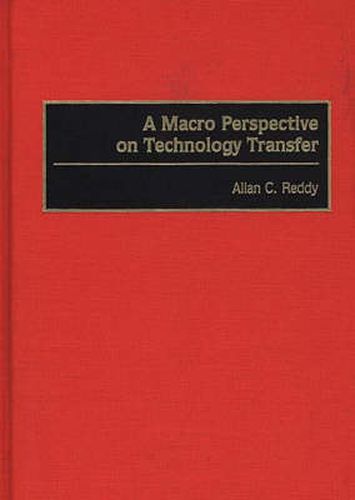Readings Newsletter
Become a Readings Member to make your shopping experience even easier.
Sign in or sign up for free!
You’re not far away from qualifying for FREE standard shipping within Australia
You’ve qualified for FREE standard shipping within Australia
The cart is loading…






Dr. Reddy points out that the key to economic success, particularly for the less developed countries of the world, is technology-but only when properly applied. Despite years of help through technology transfer, however, many LDCs are still improverished. This leads him to conclude that either the wrong technologies were transferred or the right ones were not transfered. His book thus focuses on ways in which LDCs can improve their economic growth through technology transfer, arguing that it is the assimilation of technology into their socioeconomic and cultural structures that is critical to their economic development, not the indiscriminate borrowing from advanced nations. In doing so, Dr. Reddy presents a behavioral model which proves that technology absorption is just as-if not more-important than a simple transfer process. A challenging, research-based discussion for academics in economics, business, sociology, marketing, and management, and for business and government policymakers worldwide.
Dr. Reddy introduces the concepts related to technology transfer and discusses the major participants in the worldwide transfer enterprise. He presents barriers and ways to overcome them in technology transferral, explores the ethical dimensions, and then lays out his technology transfer assimilation model. He applies the model to a specific and representative developing country, India, and ends with a discussion of conclusions that can be drawn from it. His three appendixes elaborate on the need for, and methods to, transfer technology to LDCs, provide ways to analyze the costs, and present a model of reciprocal distribution that may benefit both the donor and the recipient country in the transfer process.
$9.00 standard shipping within Australia
FREE standard shipping within Australia for orders over $100.00
Express & International shipping calculated at checkout
Dr. Reddy points out that the key to economic success, particularly for the less developed countries of the world, is technology-but only when properly applied. Despite years of help through technology transfer, however, many LDCs are still improverished. This leads him to conclude that either the wrong technologies were transferred or the right ones were not transfered. His book thus focuses on ways in which LDCs can improve their economic growth through technology transfer, arguing that it is the assimilation of technology into their socioeconomic and cultural structures that is critical to their economic development, not the indiscriminate borrowing from advanced nations. In doing so, Dr. Reddy presents a behavioral model which proves that technology absorption is just as-if not more-important than a simple transfer process. A challenging, research-based discussion for academics in economics, business, sociology, marketing, and management, and for business and government policymakers worldwide.
Dr. Reddy introduces the concepts related to technology transfer and discusses the major participants in the worldwide transfer enterprise. He presents barriers and ways to overcome them in technology transferral, explores the ethical dimensions, and then lays out his technology transfer assimilation model. He applies the model to a specific and representative developing country, India, and ends with a discussion of conclusions that can be drawn from it. His three appendixes elaborate on the need for, and methods to, transfer technology to LDCs, provide ways to analyze the costs, and present a model of reciprocal distribution that may benefit both the donor and the recipient country in the transfer process.